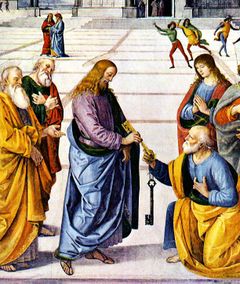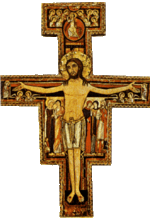Pope Innocent VIII
| Innocent VIII | |
|---|---|
| Papacy began | August 29, 1484 |
| Papacy ended | July 25, 1492 |
| Predecessor | Sixtus IV |
| Successor | Alexander VI |
| Personal details | |
| Birth name | Giovanni Battista Cybo or Cibo |
| Born | 1432 Genoa, Republic of Genoa |
| Died | July 25, 1492 Rome, Papal States |
| Other Popes named Innocent | |
| Papal styles of Pope Innocent VIII |
|
|---|---|
 |
|
| Reference style | His Holiness |
| Spoken style | Your Holiness |
| Religious style | Holy Father |
| Posthumous style | None |
Pope Innocent VIII (1432 – July 25, 1492), born Giovanni Battista Cybo (or Cibo), was Pope from 1484 until his death.
Contents |
Early years
Giovanni Battista Cybo (or Cibo) was born at Genoa of Greek extraction,[1][2][3] the son of Arano Cybo or Cibo (c. 1375-c. 1455) who under Pope Calixtus III (1455–58) had been a senator at Rome, and wife Teodorina de Mari (c. 1380-), and paternal grandson of Maurizio Cybo or Cibo and wife Saeacina Marocelli. His early years were spent at the Neapolitan court, and subsequently he went to Padua and Rome for his education.
Career
In Rome he became a priest in the retinue of cardinal Calandnini, half-brother to Pope Nicholas V (1447–55); the influence of his friends procured for him, from Pope Paul II (1464–71) the bishopric of Savona, and in 1473, with the support of Giuliano Della Rovere, later Pope Julius II, he was made cardinal by Pope Sixtus IV (1471–84), whom he succeeded on August 29, 1484 as Pope Innocent VIII.
The conclave was riven with faction, while gangs rioted in the streets. Cardinal Giuliano did not have sufficient votes at the conclave to be elected, so he turned his energies towards the election of Cybo, whom he was confident that he could control.
Shortly after his coronation Innocent VIII addressed a fruitless summons to Christendom to unite in a crusade against the infidels; the amount of his own zeal may in some degree be estimated from the fact that in 1489, in consideration of a yearly stipend of 40,000 ducats and a gift of the Holy Lance, he consented to favor Bayazid II (1481–1512) by detaining the Sultan's fugitive brother Cem in close confinement in the Vatican.
Attributions to witchcraft
During what is known as the Little Ice Age, Innocent VIII, in his papal bull Summis desiderantes (5 December, 1484) instigated severe measures against magicians and witches in Germany. The grip of freezing weather, failing of crops, rising crime, and mass starvation was blamed on witches. He issued the bull to inquisitors Heinrich Kramer and Jacobus Sprenger, to systemize the persecution of witches.[4][5]
- "It has recently come to our ears, not without great pain to us, that in some parts of upper Germany, [...] Mainz, Koin, Trier, Salzburg, and Bremen, many persons of both sexes, heedless of their own salvation and forsaking the catholic faith, give themselves over to devils male and female, and by their incantations, charms, and conjurings, and by other abominable superstitions and sortileges, offences, crimes, and misdeeds, ruin and cause to perish the offspring of women, the foal of animals, the products of the earth, the grapes of vines, and the fruits of trees, as well as men and women, cattle and flocks and herds and animals of every kind, vineyards also and orchards, meadows, pastures, harvests, grains and other fruits of the earth; that they afflict and torture with dire pains and anguish, both internal and external, these men, women, cattle, flocks, herds, and animals, and hinder men from begetting [...]"[6]
Kramer and Sprenger would later write Malleus Maleficarum in 1486 which stated that witchcraft was to blame for bad weather. In Part 2, Chapter XV titled: How they Raise and Stir up Hailstorms and Tempests, and Cause Lightning to Blast both Men and Beasts.[7] Here it states:
- "Therefore it is reasonable to conclude that, just as easily as they raise hailstorms, so can they cause lightning and storms at sea; and so no doubt at all remains on these points."
- Also see: Witch trials in Early Modern Europe
Other events
In 1487, he confirmed Tomas de Torquemada as grand inquisitor of Spain. He also urged a crusade against the Waldensians, offering plenary indulgence to all who should engage in it. In 1486, he became convinced that 13 of the 900 theses of Pico Mirandola were heretical and the book was interdicted.[8]
In Rome he built for summer use the Belvedere of the Vatican, on an unarticulated slope above the Vatican Palace, which his successor would turn into the Cortile del Belvedere. In season he hunted at Castello della Magliana, which he enlarged. Invariably short of money, he institutionalized simony at the papal court, creating new titles of offices that were discreetly auctioned.
In 1489, Ferdinand I of Naples having repeatedly refused to pay the tariff for his investiture, and a shaky peace of 1486 having failed, Innocent VIII found reason to excommunicate Ferdinand and invite Charles VIII of France to come to Italy with an army and take possession of the Kingdom of Naples. The conflict was not ended until 1494, after Innocent VIII's death.
An important event that coincided with his pontificate was the fall of Granada in January 1492, which was celebrated in the Vatican with great rejoicings. Innocent granted Ferdinand II of Aragon the epithet "Catholic Majesty."
Slavery
Minnich (2005) notes that the position of Renaissance popes towards slavery, a common institution in contemporary cultures, varied. Those who allowed the slave trade did so in the hope of gaining converts to Christianity. In the case of Innocent he permitted trade with Barbary merchants in which foodstuffs would be given in exchange for slaves who could then be converted to Christianity.[9]
King Ferdinand of Aragon gave Innocent one-hundred Moorish slaves who shared them out with favoured Cardinals.[10] The slaves of Innocent were called "moro", meaning "dark skinned man", in contrast to negro slaves who were called "moro nero".[11]
Family
Innocent VIII died on July 25, 1492, leaving behind him two illegitimate children, born before he entered clergy. [12] Another source says "sixteen", the remaining fourteen of which were presented as nephews. [13] The title Padre della patria (= Father of the Fatherland) was suggested for him, precisely with reference to these sixteen children of his. [14] In 1487 he married his elder son Franceschetto Cybo (d. 1519) to Maddalena de' Medici (1473-1528), by whom he had issue, the natural daughter of Lorenzo de' Medici, who in return obtained the cardinal's hat for his thirteen-year-old son Giovanni, later Pope Leo X. His daughter Teodorina Cibo married Gerardo Usodimare and had a daughter. Savonarola chastised him for his worldly ambitions. The unsympathetic Roman chronicler Stefano Infessura provides many lively details, among them the apparent attempt to revive Innocent VIII on his deathbed by blood transfusions from three young male children (who died as well in the process).[15]
References
- "Black Africans in Renaissance Europe", N. H Minnich, Thomas Foster Earle, K. J. P. Lowe, Cambridge University Press, 2005, ISBN 0521815827
- "For the glory of God: how monotheism led to reformations, science, witch-hunts, and the end of slavery", Rodney Stark, p. 330, Princeton University Press, 2003, ISBN 0691114366
- "The problem of slavery in Western culture", David Brion Davis, Oxford University Press US, 1988, ISBN 0195056396 [1]
Notes
- ↑ The Every Day Book of History and Chronology Embracing the Anniversaries of Memorable persons and events in every period and state of the world, from the creation to the present time, Joel Munsell, 1858 Appleton, University of Michigan, p.295
- ↑ The Chronicles of Enguerrand de Monstrelet, Enguerrand de Monstrelet, Bon Joseph Dacier, 1849 H.G. Bohn, Oxford University, p.458
- ↑ The history of the Christian church during the Middle Ages with a summary of the reformation, centuries XI to XVI, Philip Smith, 1885 Harper & bros, University of Michigan, p.219
- ↑ Levack, The Witch-Hunt in Early Modern Europe, (49)
- ↑ Heinrich Institoris, Heinrich, Sprenger, Jakob, Summers, Montague; The Malleus maleficarum of Heinrich Kramer and James Sprenger; Dover Publications; New edition, June 1, 1971; ISBN: 0486228029
- ↑ http://en.wikisource.org/wiki/Summis_desiderantes Wikisource, Summis desiderantes, by Pope Innocent VIII.
- ↑ Malleus Maleficarum (1486)
- ↑ "Giovanni Pico della Mirandola". Catholic Encyclopedia 1913. New Advent. 1913. http://www.newadvent.org/cathen/10352a.htm.
- ↑ Minnich, p. 233
- ↑ "For the glory of God", Rodney Stark, p. 330, Princeton University Press, 2003, ISBN 0691114366)
- ↑ David Brion Davis, p. 101 fn. 21
- ↑ Catholic Encyclopedia article on Pope Innocent VIII
- ↑ "towards whom his nepotism had been as lavish as it was shameless" (Encyclopaedia Britannica 1911).
- ↑ http://www.romeartlover.it/Talking.html
- ↑ Discoveries in medicine: blood transfusion.
| Catholic Church titles | ||
|---|---|---|
| Preceded by Sixtus IV |
Pope 1484–92 |
Succeeded by Alexander VI |
|
|||||||||||||||||||||||||||||||||||||||||||||
|
|||||||||||||||||||||||||||||||||||||||||

